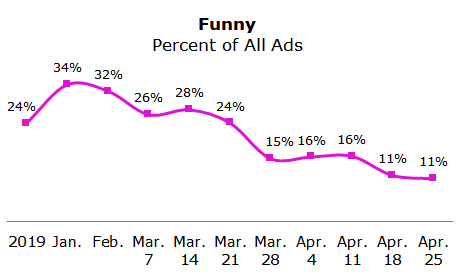While a B2C brand like Patagonia can advertise a slogan that says “Vote the Assholes Out”, B2B brands are very restrained in their communications and seldom create bold campaigns. This report comprises five examples of B2C brands and one example of a B2B brand’s marketing campaign/commercial with themes related to the pandemic, the US elections, and the Black Live Matter movement.
Table of Contents
US ELECTIONS
Ben & Jerry’s Justice Remix’d
- Ben and Jerry’s, known for its liberal views, launched a new flavor–“Justice Remix’d, a cinnamon and chocolate ice cream with cinnamon bun dough and fudge brownies”– targeted primarily at younger and first-time voters to spark a conversation about “racial inequity and criminal justice reform.” The company, in its press release, said that “young people (37% of the voter base) have the ability to determine the outcome of this election.”
- The brand promoted its voting initiative on Twitter and Instagram where it invited consumers to keep “justice on the brain—and the spoon!”

- “Voters could sign their digital support for the campaign on the brand’s website and receive updates from partner organization Color of Change.” A total of 105,000 digital signatures were recorded.
- “Our approach to creating social change is to raise up the work non-profits are doing on the ground. We bring every resource we have to support them—our business voice, our connection with fans, our Scoop Shop community, and of course, ice cream. Somehow, it’s easier to talk about difficult issues over a scoop or two,” said Ben and Jerry’s co-founder Ben Cohen in a statement.
- “A portion of the proceeds from the new flavor was donated to the advancement project National Office’s Free and Safe Campaign. The Justice Remix’d flavor was part of a multi-year campaign for criminal justice reform.”
- “Ben & Jerry’s also offered an in-shop incentive for potential voters by including any order with a free waffle cone if they ‘pledged to vote for justice’. By incentivizing customers to get out and vote, Ben & Jerry’s sustained its image as a politically present brand.”
- One of its tweets, where it called the President a “liar”, received 66k likes and was retweeted 13.9k times:

- The brand also ran a “Pledge to Vote” sweepstakes contest, wherein those who pledged to vote between Oct. 11 and Oct. 25, stood a chance to win Killer Mike’s (donated) pair of Nike SB Dunk Low “Chunky Dunky” (created in partnership with Ben & Jerry’s) size 13 sneakers, all four albums of Killer Mile’s music group Run The Jewels, a Run The Jewels hoodie, and a year’s supply of ice cream.
- “Ben & Jerry’s channels also served updated voting information, including early voting state lists, polling locations, and an hour by hour countdown to election day. For those that visited a Ben & Jerry’s store prior to voting, the shops included local election information and ways for customers to register to vote or check their registration.”
- According to a Gartner forecast, “promoting its voting initiative and ice cream release could grow Ben & Jerry’s audience and boost interactions with its socially active consumers.”
Patagonia’s “Vote the Assholes Out”
- “Known for its strong stance on environmentalism, outdoor brand Patagonia included a special message on the labels of its 2020 Men’s and Women’s Regenerative Organic Stand-Up Shorts— the underside of the backside tags of the shorts read “Vote the Assholes Out”. The Regenerative Organic Stand-Up Shorts were chosen as the brand has been standing up to climate deniers for almost as long as they’ve been making” them.
- “Patagonia’s founder, Yvon Chouinard, had been talking about voting the assholes out for several years and by ‘assholes,’ he meant ‘politicians from any party who deny or disregard the climate crisis and ignore science.’
- The brand tweeted a close-up picture of the “clothing tag being pushed up by the tip of a finger” to reveal the message “Vote the Assholes Out”, making its political stance loud and clear. The tweet went viral and garnered 55,000 likes in less than a week.

- “Outside of the shorts, Patagonia also provided on its site resources for customers who want to vote for those supporting climate change. There, it presented a tamer statement, ‘Vote climate deniers out of office.’”
- Through an interactive map, the brand’s website highlighted Senate races where there was the most opportunity for climate change, urging voters to consider.

- “The company also partnered with Ballot Ready, an organization that educates people about issues on the ballot, to help them follow through on the advice.” Additionally, Patagonia supported Power to Polls to enable the recruitment of poll workers for the 2020 elections.
- Through the “Vote the Assholes Out” campaign, Patagonia aimed to “encourage people to vote, and, more specifically, to vote climate deniers out of office.”
- The company was praised for its “bold, straightforward messaging and Patagonia customers on Twitter were delighted and said that the tags deepened their loyalty.”
- The brand saw “outreach from most major media outlets, traditional print publications and also online outlets and television,” which drove traffic to its website.
- The company’s website also featured the trailer of their then upcoming film–“Public Trust“–on the threats facing public lands and waters. The film was released shortly after, in September 2020 itself, and according to The Guardian, it did an “admirable job” of “explaining the rise of the anti-public-land sentiment“.
- “Three years ago, Patagonia sued the Trump administration over the president’s downscaling of federal land protections of the Bears Ears National Monument in Utah. At the time, Patagonia.com was overtaken by a bold declaration in black and white ‘The President stole your land.’” The brand saw its sales numbers rise after its lawsuit.
BLACK LIVES MATTER
Salesforce’s BOLD
- Salesforce showed support for the Black Live Matter movement via social media. The company created a new Twitter handle around Black employees named BOLD (Black Organization for Leadership and Development–an Employee Resource Group for Black employees and allies). The company blacked out its Twitter icon and has retweeted @BoldForce, which held livestreams on “Injustice and Race” to spark public conversations.

- The “Injustice and Race” discussion was part of Salesforce’s Leading Through Change series. “The discussion was hosted by Salesforce EVP and Chief Philanthropy Officer Ebony Beckwith, and Salesforce Chair and CEO Marc Benioff. Some powerful and unequivocal comments made by Salesforce’s management during the discussion:
- Ebony Beckwith: “Systemic racism is not new. It’s been around for many, many years—far too long. It’s really hard to imagine where we even start. How do we make change? This is going to be a difficult, yet very powerful and necessary conversation. So we are going to have to get comfortable being uncomfortable.”
- Marc Benioff: “Like many of you, I have a very heavy heart about the terrible murder of George Floyd and countless others that we’ve had to recount. There’s something about the trauma we’re going through right now that reopens all the other traumas. It’s like a window that we look through to see everyone else that we’ve lost.”
- Marc Benioff: “This is the latest example of the systemic racism that continues to plague our country. These are difficult times, and we’re living through one of the most challenging moments of our lives and for our country.”
- Marc Benioff: “So many of you are so deeply suffering right now, are grieving, are angry, or are so justifiably afraid. I understand, and I feel the fear. I think we have to be here to listen.”
- Marc Benioff: “I just want to be absolutely clear about where Salesforce stands as a company: We’re guided by our core value of equality, and we stand as allies with the Black community.”
- Salesforce wrote about the Black Lives Matter movement in its recruiting content. The company also published a blog called “8 Ways to Stand in Support of the Black Community.”
- The company made a “commitment to double the U.S representation of Black employees in leadership (VP+) by the end of 2023,” launched a Racial Equality and Justice task force to help drive systemic change in its workplace and advocate for public policy reform surrounding policing, and also said that it will “transition from counting spend with diverse suppliers into measuring impact in the communities those suppliers touch.”
- Salesforce announced it will make a $1 million donation to the National Association for the Advancement of Colored People (NAACP), one of several monetary commitments toward fighting inequality and injustice that Black communities in the US face.
- The company ranks highly on Kanarys’s–“a platform that enables mid-and-large-size companies to make informed strategic decisions about equity and workplace fairness issues”– diversity and inclusion rankings; the “Black Lives Matter” initiatives will only strengthen its position further.
- While there were no success metrics found specific to the campaign, we included this case study as Salesforce’s CEO, “considered the poster child for CSR,” was one of the first to make a public statement on the George Floyd incident and, historically, the company has walked the talk on diversity and inclusion.
P&G’s “The Choice”
- “Procter & Gamble released a powerful ad, ‘The Choice,’ that asked White people to use their position of power in America to actively combat racism. The ad showed a close-up of Black and White people and addressed privilege. It debuted on the Oprah-hosted CBS special ‘Where Do We Go From Here’ that focused on the civil unrest that emerged following the death of George Floyd while in police custody.”
- The ad “emphasized that white individuals not personally being racist was not enough to create real change and implored them to acknowledge the role they play in fighting prejudice and serving as allies to racial justice causes. ‘Now is the time to be anti-racist,’ the ad read, urging viewers to participate in actions that could spread the word to others, such as marching, donating, and voting.”

- “Being white in America is not needing to state your life matters. And when your life matters, you have power. Now is the time to use it,” the ad read.
- “‘The Choice’ ad ended by directing viewers to a section of P&G’s website that provided resources for tackling racism.”
- The ad was well-received by audiences with 24% of viewers feeling inspired by the ad. Fifty-four percent of viewers, 15% higher than the US norm of 39% for ads, wanted to find out more. The brand (51%) also scored higher than the US average (31%) on brand favorability.
- P&G “attracted praise for their social responsibility,” producing boundary-pushing creative and entering bold territory.
- “With ‘The Choice,’ P&G adopted a different approach to its purpose-led messaging on race, while still aligning the ad with prior efforts that have sparked discussion like ‘The Talk’ from 2017 and ‘The Look’ from” 2019.
- In addition to the campaign, P&G underwrote “two films by the Queen Collective on BET, ‘Gloves off’ and ‘Tangled Roots,’ and also sponsored a Time 100 Talks virtual event titled ‘Equality at a Tipping Point.’”
- “For P&G, pledging to be a force for social change meant approaching campaigns differently, focusing on progress over perfection, and not retreating even amid backlash. Forfeiting potential customers is sometimes part of committing to these meaningful conversations, said the brand’s Chief Communications Office Damon Jones.”
- While many “Black Lives Matter” themed ads drew criticism for being exploitative, P&G was able to “ward off such criticism given its longer history discussing racism and by providing financial support to relevant causes.”
- The company made a “$5 million donation as part of its ‘Take on Race’ fund that included partner organizations like the NAACP Legal Defense and Education Fund, YWCA Stand Against Racism, and the United Negro College Fund.”
PANDEMIC
Burger King’s “Stay Home of the Whopper”
- Burger King launched an “ad promoting its delivery app and staying home during the coronavirus pandemic shutdowns.” However, it did so with a humor-theme, at a time most brands were avoiding doing so (especially while taking a stand during a crisis).

- “Burger King took a stand to encourage consumers to honor the CDC’s social distancing guidelines and stay-at-home orders in a playful way that also saluted the healthcare professionals who confronted the pandemic daily.”
- The “Stay Home of the Whopper” commercial encouraged consumers to be “couch po-ta-triots” and heroes by staying home to help prevent the spread of coronavirus.

- “Alluding to the wartime ad, the spot opens with a voiceover stating: “Your country needs you… to stay on your couch and order in” while a man lazes on the sofa.
- “Do your part and we’ll do ours. Order through the Burger King app and the delivery fees are on us. So staying home doesn’t just make us all safer, it makes you a couch po-ta-triots,” the voiceover continued.”
- “The ad also showed how the company was helping by donating Whoppers to nurses through the American Nurses Foundation. Additionally, it let viewers know that they could contribute to support the American Nurses Foundation Coronavirus Response Fund by texting THANKS to 20222.”
- It also “waived off the delivery fee on orders over $10 on its app to boost app orders,” in order to drive app downloads and home-ordering during the pandemic.
- While airing a funny ad at the beginning of the outbreak (in April) was risky (very few brands dared to make a funny ad), Burger King has had a lot of experience with funny ads; “86% of its ads from the past two years scored well on being funny with our 16-20-year-old audience.”
- The brand scored “significantly above COVID-19 norms” with the 16-20-year-old segment” (teens spend a quarter of their money on food) and “performed around the norm for those aged 21-35 and 36-49.”
- The ad was also recognized as one of the best and funniest ads of 2020 by industry people and the media.
Frito-Lay’s “It’s About People”
- “Frito-Lay launched a commercial that boldly claimed that the middle of the COVID-19 crisis was not about brands. The brand preached that it was a time to “forget all the sales pitches disguised as emotional empathy or silly logo redesigns and that it wasn’t a time to be ‘advertising‘, essentially scolding other brands for being so gauche as to advertise in the middle of a pandemic,” while using a commercial to do so.

- “The ad encouraged consumers to visit fritolay.com/action, where they could learn more about what the brand was doing to support coronavirus relief. Visitors could also directly e-mail flnaaction@pepsico.com to share how they were helping their community and how additional support could make an impact.”
- Frito-Lay also conveyed in the ad that it “created 3,000 new full-time jobs with benefits, donated over $15 million to relief efforts, provided 20 million meals to at-risk students and families, and funded mobile health clinics across the United States to provide COVID-19 screenings.”
- The brand’s “holier-than-thou anti-ad sentiment” commercial was a bold take and seemingly contradictory; however, it ranked as the most empowering brand on Ace Metrix’s top-performing ads in Q2 2020, “indicating the ad’s message inspired, encouraged or motivated viewers.”
- While there was criticism for some quarters of media for using an ad to convey anti-ad sentiment and taking a dig at other brands, a study by VAB found that “Frito-Lay’s approach was spot on” for the pandemic.
- Frito Lays was able to successfully shift its communication focus from the “product or brand hero story” to one that empowered consumers.




